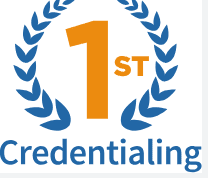Physical therapists assist patients in gaining mobility, healing wounds, and performing functional activities. A PT should have a rigorous credentialing process before they can treat patients and get the insurance bill payments.
This involves the establishment of a CAQH ProView profile, Medicare (CMS) enrollment, commercial payer contracting, and adherence to state-level regulations. It is lengthy, tedious, and mainly paper-based to most PTs. This has prompted a large number of physical therapists to resort to credentialing agencies with extensive knowledge of the rehab therapy processes and payer features.
This book has a list of the leading credentialing agencies of physical therapists in 2025, compares what they offer as well, and assists you in selecting the appropriate credentialing partners in relation to your practice or rehab family.
What Is Physical Therapy Credentialing?
Credentialing of physical therapy is the process of assuring the qualifications and registering a PT with the insurance companies. This will make them bill outpatient rehab, sports therapy, and telehealth PT. Key elements include:
- PT or DPT degrees
- State licensure
- NPI registration
- CAQH ProView profile
- Medicare and Medicaid insurance.
- Malpractice insurance
- Employment history
- Board certifications
The PTs are credentialed and contracted by insurance payers to be able to charge outpatient rehab, sports therapy, or multiplexing services.
Why Credentialing Matters for PT Practices
Credentialing must be done since it:
- Make sure payments by insurance companies to PTs are made once they have been fully enrolled.
- Minimizes the threat of claims denials.
- Audits and complies with Medicare documentation.
- Multiple payers help PT clinics have clean and accurate profiles.
- Eliminates late payments due to lost documents, inaccurate PECOS keying, or inaccurate CAQH attestation.
Why PTs Need Specialized Credentialing Services
Physical therapists have special needs in credentialing requirements, which many generic billing or credentialing agencies are not in a position to manage. Credentialing specialist services assist the PT practices to deal with:
1. Documentation Requirements
Physical therapy needs extensive treatment records, referrals, supervisory records, and outcome records. Credentialing errors may slow down approval and patient treatment.
2. Medicare Complexity
Medicare has extensive reimbursement for outpatient PT, and this entails additional procedures like:
- PECOS enrollment
- Revalidation
- Reassignment to a group NPI
- PQRS / MACRA compliance (recommended)
- Therapy cap rules
Mistakes may lead to the denial of claims or recoupments by Medicare.
3. Higher Denial Rates
PT claims are also often audited or denied because of:
- Missing documentation
- Wrong enrollment of providers.
- Unlinked NPI or TIN
- Outdated CAQH profiles
A successful credentialing team is used to avoid these problems.
4. Multi-Location Group Likes.
Rehab therapy groups and outpatient clinics usually encounter:
- Training new PTs at the same time.
- Other state licensure regulations.
- Telehealth PT enrollment
- Assistant and aided credentialing.
One of the processes that a professional partner facilitates is simplified.
Top 7 Credentialing Companies for Physical Therapists – 2025
PTs widely use these firms for Medicare, payer panels, CAQH, and insurance contracting.
1. Credex Healthcare

PTs rely on Credex Healthcare to process provider enrollment, Medicare PECOS, CAQH, and commercial payer contracting. Credex is favored in many PT clinics, as they understand the rehab processes and the rules of payers.
PT-Specific Services:
- First CAQH establishment and re-establishment.
- Medicare/Medicaid enrollment
- Group & individual NPI setup
- Telehealth PT Credentialing.
- Outpatient therapy clinic credentialing.
- Contract negotiations with Aetna, UHC, BCBS, Cigna, and so on.
Advantages: Rapid turnaround time, PT-teams, low-cost packages, good payer follow-up.
Disadvantages: Bottleneck slot purchase-timing-attractiveness.
Pricing: $150–$350 per PT per month
Rationale: PTs Select them: Guarantees a smooth credentialing and billing process.
2. 1st Provider Credentialing
Reputed for the detail and appropriate documentation, assisting the PTs, DPTs, and multi-payer rehab clinics.
PT-Specific Services: PECOS Medicare enrollment, payer panel, CAQH updates, Medicaid enrollment, group practice credentialing.
Advantages: Good customer relationship, effective communication, experience in PT-specialty.
Disadvantages: Multi-state group pricing may be increased.
Pricing: $250–$400 per provider
Their reason is that PTs are responsive and can fit smaller practices.
3. VerityStream
Compliance-based software based on a large-scale credentialing solution for hospitals and therapy groups.
Single-source credentialing software, license checking, automatic enrollment, Medicare/Medicaid services, and PT-Specific Services.
Advantages: Suited to big rehab groups, compliance instruments.
Cons: Expensive for solo PTs
Pricing: Custom quotes
Reasons Why PTs Select It: Ideal in multi-clinic therapy groups that have between 20 and 200 providers.
4. Medwave
Useful in outpatient PT clinics that need fast credentialing.
PT-Specific Services: Medicare enrollment, commercial insurance enrollment, CAQH, and payer revalidations.
Advantages: Two years of experience in rehab therapy, no difficulties in communication.
Cons: No billing support
Pricing: $200–$350 per provider
Reason why PTs Select them: Strauss and straightforward credentialing.
5. VantagePoint
Offers end-to-end compliance and credentialing of PT practices.
CAQH setup, commercial and Medicare enrollment, maintenance of credentialing, group practice management PT-Specific Services.
Advantages: PT workflows, reporting tools.
Cons: Complex onboarding
Pricing: $300–$500 per PT
Reasons why PTs use them: They are great in organized dashboards and compliance.
6. Medusind
Provides credentialing and billing for the practice of PT.
Specific PT Services: Medicare enrolment, CAQH, insurance panel contracting, PT billing, and RCM.
Advantages: End-to-end services, effective claim follow-up.
Cons: Long contract terms
Pricing: $200–$350 per provider
PTs select them: They work well in clinics that require credentialing and revenue cycle management.
7. Symplr

Hospital and rehab network national credentialing company.
PT-specific services: PT-provider verification, enrollment management, and PT compliance tools.
Advantages: Strong analytics, safe.
Disadvantages: Enterprise pricing exclusively.
Pricing: Custom quotes
Reasons why PTs Select them: Suits PT departments well within the healthcare organizations.
How to Choose the Right Credentialing Partner
The Dilemma of Selecting the Right Credentialing Partner.
A PT clinic does not suit all companies. Consider:
- PT Experience: coupled with experience in outpatient rehab, sports therapy, and home health.
- Purchasing Openness: Evade charges, concealed expenses, or unpleasant surprises.
- Claims Support: Provide early detection of claims challenges in the credentialing.
- Medicare Knowledge: PECOS, reassignments, revalidation, and audit documentation should be known to your partner.
Benefits of Outsourcing PT Credentialing
- Quick-er Payer Enrollment: Experts eliminate the wasted time and lost paperwork.
- Increased Reimbursements: Proper attracting credentials decreases claims denials.
- Proper Documentation: Do not have spoiled CAQH or interstate license problems.
- Decreased Administrative errors: Credentialing teams take care of the timescale in order to allow the PTs to attend to patients.
Final Thoughts
PTs have a complicated process of credentialing. Selecting a specialty partner helps minimize errors and claims denials, as well as maximize revenues. The PTs have to have partners who will guide them on their responsibilities, payments, and the laws that govern modern rehab therapy.
FAQs
1. What is the length of time for PT credentialing?
It believes that the average turnaround time on PT credentialing is 60120 days with large payers.
2. Which documents do they require during the PT credentialing?
PT/DPT degree, state license, NPI, CAQH ProView profile, malpractice insurance, resume, driver’s license, and records on practice ownership.
3. Are Medicare enrollments done by credentialing firms?
Yes. PECOS enrollment, reassignment, and revalidation are generally included.
4. What is the cost of credentialing PT?
Depending on the service level $150 to $600.
5. Is telehealth credentialing of PTs possible?
Yes. Most payers, such as Medicare in some instances, do permit telehealth PT credentialing.












